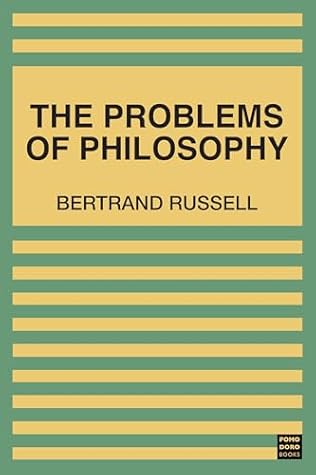More on this book
Community
Kindle Notes & Highlights
The progress of science is constantly producing such subsumptions, and therefore giving a constantly wider inductive basis for scientific generalizations. But although this gives a greater degree of certainty, it does not give a different kind: the ultimate ground remains inductive, i.e. derived from instances, and not an a priori connexion of universals such as we have in logic and arithmetic.
the law of contradiction states that nothing can both have a certain property and not have it. This is evident as soon as it is understood, but it is not so evident as that a particular rose which we see cannot be both red and not red. (It is of course possible that parts of the rose may be red and parts not red, or that the rose may be of a shade of pink which we hardly know whether to call red or not; but in the former case it is plain that the rose as a whole is not red, while in the latter case the answer is theoretically definite as soon as we have decided on a precise definition of
...more
Two propositions are coherent when both may be true, and are incoherent when one at least must be false.
In accordance with our three requisites, we have to seek a theory of truth which (1) allows truth to have an opposite, namely falsehood, (2) makes truth a property of beliefs, but (3) makes it a property wholly dependent upon the relation of the beliefs to outside things.
We may restate our theory as follows: If we take such a belief as 'Othello believes that Desdemona loves Cassio', we will call Desdemona and Cassio the object-terms, and loving the object-relation. If there is a complex unity 'Desdemona's love for Cassio', consisting of the object-terms related by the object-relation in the same order as they have in the belief, then this complex unity is called the fact corresponding to the belief. Thus a belief is true when there is a corresponding fact, and is false when there is no corresponding fact.
There can be no doubt that some of our beliefs are erroneous; thus we are led to inquire what certainty we can ever have that such and such a belief is not erroneous. In other words, can we ever know anything at all, or do we merely sometimes by good luck believe what is true?
What we firmly believe, if it is true, is called knowledge, provided it is either intuitive or inferred (logically or psychologically) from intuitive knowledge from which it follows logically. What we firmly believe, if it is not true, is called error. What we firmly believe, if it is neither knowledge nor error, and also what we believe hesitatingly, because it is, or is derived from, something which has not the highest degree of self-evidence, may be called probable opinion. Thus the greater part of what would commonly pass as knowledge is more or less probable opinion.
The essential characteristic of philosophy, which makes it a study distinct from science, is criticism. It examines critically the principles employed in science and in daily life; it searches out any inconsistencies there may be in these principles, and it only accepts them when, as the result of a critical inquiry, no reason for rejecting them has appeared.
all refutation must begin with some piece of knowledge which the disputants share; from blank doubt, no argument can begin.
The criticism aimed at, in a word, is not that which, without reason, determines to reject, but that which considers each piece of apparent knowledge on its merits, and retains whatever still appears to be knowledge when this consideration is completed.
The 'practical' man, as this word is often used, is one who recognizes only material needs, who realizes that men must have food for the body, but is oblivious of the necessity of providing food for the mind. If all men were well off, if poverty and disease had been reduced to their lowest possible point, there would still remain much to be done to produce a valuable society; and even in the existing world the goods of the mind are at least as important as the goods of the body. It is exclusively among the goods of the mind that the value of philosophy is to be found; and only those who are
...more
If you ask a mathematician, a mineralogist, a historian, or any other man of learning, what definite body of truths has been ascertained by his science, his answer will last as long as you are willing to listen. But if you put the same question to a philosopher, he will, if he is candid, have to confess that his study has not achieved positive results such as have been achieved by other sciences. It is true that this is partly accounted for by the fact that, as soon as definite knowledge concerning any subject becomes possible, this subject ceases to be called philosophy, and becomes a
...more


